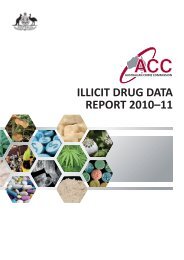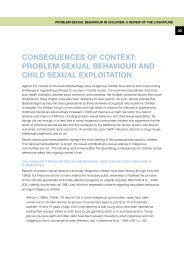Annual Report - COMPLETE - Australian Crime Commission
Annual Report - COMPLETE - Australian Crime Commission
Annual Report - COMPLETE - Australian Crime Commission
Create successful ePaper yourself
Turn your PDF publications into a flip-book with our unique Google optimized e-Paper software.
ACC Board<br />
The ACC Board is responsible for establishing national criminal intelligence<br />
priorities (NCIP), setting ACC priorities and strategic direction, authorising access<br />
to the coercive powers, authorising special intelligence operations and special<br />
investigations, determining intelligence operations and investigations, disseminating<br />
strategic criminal intelligence assessments, and reporting to the IGC on the ACC’s<br />
performance.<br />
The ACC Board has the following members:<br />
• <strong>Commission</strong>er of the AFP as Chair of the ACC Board;<br />
• Secretary of the Commonwealth Attorney-General’s Department;<br />
• CEO of ACS;<br />
• Chairperson of ASIC;<br />
• Director-General of Security;<br />
• <strong>Commission</strong>ers of all state and territory police forces;<br />
• Chief Police Officer of the ACT; and<br />
• CEO of the ACC (as a non-voting member of the ACC Board).<br />
The ACC Act provides that the ACC Board must meet at least twice yearly. In<br />
2003–04, the ACC Board met on three occasions - 22 September and 4 December<br />
2003, and 28 April 2004. A further meeting scheduled for June 2004 was postponed<br />
until September. These followed three earlier meetings in the six months following<br />
the establishment of the ACC on 1 January 2003. The early meetings focused on<br />
setting the strategic direction for the ACC required by the ACC Act. Important decisions<br />
included the endorsement of the ACC Board’s Charter of Governance, the approval<br />
of processes for ACC authorisations and the determination of the NCIPs. The ACC<br />
Board also made a number of authorisations and Determinations which provided<br />
the legislative basis for the important work of the ACC. Where these authorisations<br />
included provision for the use of the ACC’s coercive powers, the members of the<br />
IGC-ACC were advised in accordance with the provisions of S9 of the Act.<br />
ACC ANNUAL REPORT 2003–04 I 13<br />
1<br />
PROFILE, GOVERNANCE AND PERFORMANCE




